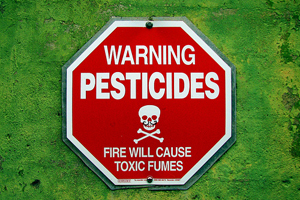The other two studies were conducted in more urban environments in New York City. In these studies done by researchers at Mount Sinai Medical Center and Columbia University, pesticide exposure was determined by measuring either urine metabolites or umbilical cord levels of the pesticide chlorpyrifos, respectively. Intelligence scores were significantly lower in children whose mothers had been exposed to the most pesticides while pregnant, indicating that these results are consistent across populations and not limited to farming communities.
In urban populations, pesticide exposure often comes from eating crops that have been treated with pesticides. People can also come into contact with pesticides in home gardens, schools and other public buildings with landscaping.
The good news is that use of organophosphate pesticides have declined steadily over the past decade, declining approximately 50 percent since 2001. Also, though choosing organic produce will help decrease pesticide exposure through food, consumers shouldn't feel they need to switch to 100% organic to protect their children.
Every year the Environmental Working Group publishes the “Dirty Dozen,” a list of the conventional produce likely to contain the highest amount of pesticides. It also publishes a list of the cleanest conventional foods, “The Clean 15,” with the lowest pesticide levels. The researchers found that the impact of pesticides on intelligence scores is dose dependent, meaning any reduction in exposure can be beneficial.
While making these decisions it is important to realize that eating a wide variety of fresh fruits and vegetables is one of the most important thing you can do for the health of your developing baby. You should not drastically restrict the different kinds of produce you consume while pregnant. Being smart about which organic foods you purchase, and carefully washing the conventional produce you continue to buy can make a big impact on your exposure.
Are you worried about pesticide exposure? How do you handle it?
37.87241 -122.259616
 Pregnant mothers with the highest exposure to pesticides had kids with lower IQ at age 7. Image courtesy of C. G. P. Grey.
Pregnant mothers with the highest exposure to pesticides had kids with lower IQ at age 7. Image courtesy of C. G. P. Grey.